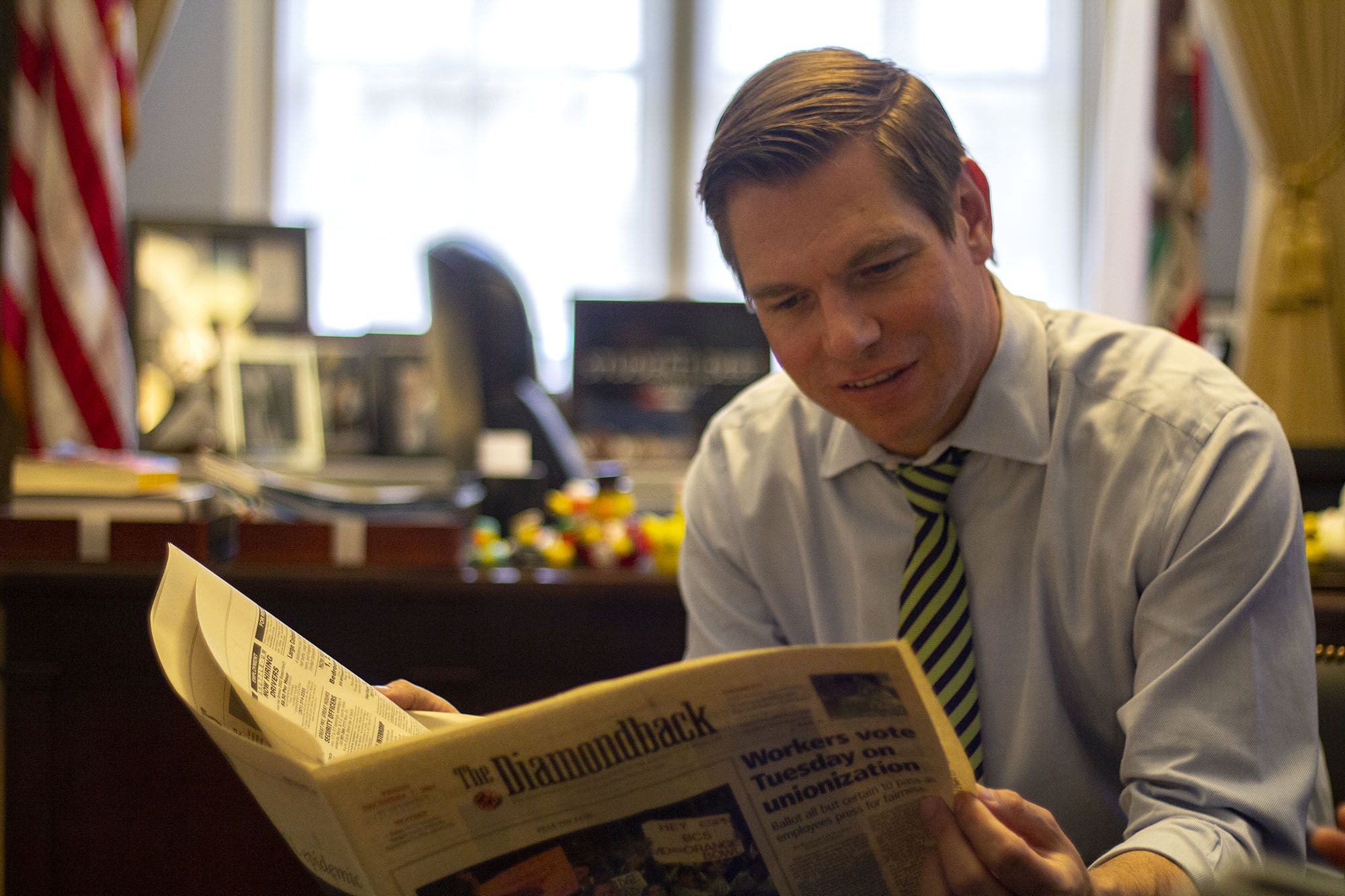When Congressman Eric Swalwell arrived at the University of Maryland in 2001, he encountered a campus at odds with its city.
After the Terps basketball team blew a 22-point lead against Duke in the Final Four that March, university students lit more than 60 fires around the city, causing about $500,000 in damage.
So, in an attempt to mend the relationship, Swalwell worked to get a university student on the city council.
But Swalwell, who would become the city’s inaugural student liaison, hasn’t forgotten the bad blood that started it all.
“I feel like it’s just petty to root against Duke now because we’re not conference rivals,” the California Democrat said, “but I still root against Duke.”
As a member of the House Judiciary Committee, House Permanent Select Committee on Intelligence and the ranking member on the CIA Subcommittee, Swalwell has founded himself a presence on the national stage, at the forefront of the investigation into Russian meddling in the 2016 presidential election.
Swalwell, a frequent critic of President Trump, has not shied away from the spotlight. His social media activity and numerous national television appearances — more than 270 this year, according to spokesperson Josh Richman — suggest the former Terp may be gearing up for a potential run for president in 2020.
Swalwell, who is expecting his second child soon and working on publishing his book, said he’s in no hurry to make a decision. Despite mounting television appearances and trips to Iowa — the first state to vote in presidential primaries — the congressman said he is carefully considering his next step.
“I see it as midterms, full term and then a decision about the long-term,” Swalwell said.
Although Swalwell is a rising star among Democratic ranks, many still consider him to be a long shot to win the party’s nomination in 2020 — if he decides to run. If elected, he’d be 40 on Inauguration Day, making him the youngest president in U.S. history.
Eric Olson, a former College Park City Councilmember, said Swalwell hasn’t changed since he first met him more than 15 years ago.
“He’s every bit as down to earth as he always has been. He’s still the Eric Swalwell we all knew here,” Olson said. “Even when he’s on the national stage, he doesn’t forget his roots.”
“A seat at the table”
Born in Iowa and raised in California, Swalwell transferred to this university after an injury derailed his Division I soccer career at Campbell University in North Carolina.
This university’s close proximity to Washington, D.C., added to its allure, he said. In 2001 and 2002, he interned for Rep. Ellen Tauscher, D-Calif., on Capitol Hill.
But Swalwell’s political career at this university almost ended before it began.
Prior to his election as the Student Government Association’s vice president of campus affairs, Swalwell was nearly disqualified from the election due to accusations claiming he had campaigned too early for the position and was not in good financial standing with this university.
Swalwell, now 37, made it work. Between odd jobs and help from his family, he earned enough money for tuition, and he would go on to win the seat with more than 57 percent of the vote, beginning his career of public service.
His political aspirations, though, extended beyond student government.
As Swalwell campaigned for a seat in the SGA, he couldn’t help but take notice of the increasing friction between students and city residents. The riots from the previous spring had continued into the fall with the success of the football team, which would go on to play in the Orange Bowl that season. By the end of 2001, the administration had received more than 500 complaints, and as a result, the community was reeling.
“There were a lot of riots and a lot of tension being created between students and residents of the community,” Swalwell said.
Swalwell reached out to Olson, and together the two worked to create the position of student liaison to the city council.
“He was really all about bringing the community together, bridging the community and student divide,” Olson said. “I was really glad to see that. He had the right perspective; he was well-respected by community members as well as students.”
The non-voting position was formally approved by the city council in April 2002 and still exists today. As Swalwell put it, it was “a seat at the table,” giving the student population a voice in city matters. The student liaison would have space allotted for them to speak on the agenda, sit at meetings and closely interact with city staff.
“Eric has established a relationship with the city that no student has had for many years, if ever,” then-SGA President Brandon DeFrehn said.
The student liaison position would be Swalwell’s first true foray into local politics — and he didn’t take it lightly.
“I was taken seriously and I had to act serious,” Swalwell said. “You’re now at the table with truly adults, elected officials, and you can’t just take potshots from the gallery. You actually have to roll up your sleeves and work on the issues.”
In one of his first orders of business as student liaison, Swalwell, a member of the Alpha Sigma Phi fraternity, helped organize community cleanup days every Sunday to help build trust between students and city residents. Each week, a fraternity and sorority would help pick up trash that littered the community after a night of partying.
Paul Mandell, a 1995 graduate of this university and fellow member of the behavioral and social sciences college’s Board of Visitors , took notice of Swalwell’s endeavors after meeting when they both delivered speeches during Swalwell’s 2003 graduation ceremony.
“Having brought together the university and the city of College Park in a way that many had tried and often failed, I knew at that point if he was able to crack that nut he had a lot of great accomplishments ahead,” Mandell said.
Olson, who Swalwell considers a mentor, said he noticed something special about Swalwell early in their relationship. From his own experience working on Capitol Hill and for Sen. Bernie Sanders, Olson could tell Swalwell was destined for bigger things.
“I knew he would be on the national stage at some point, it wasn’t like he was gunning for that then necessarily, but I could just tell,” Olson said.
Swalwell was frequently politically-engaged while on the campus. In May 2003, he donned a Hawaiian shirt and black wig and assumed the alter-ego of “Bahama Bob,” a jab at then-Maryland Gov. Bob Ehrlich. Ehrlich was vacationing in The Bahamas, while the University System of Maryland was planning to increase tuition about 15 percent as a result of his budget cuts back home.

Rep. Eric Swalwell, in the spring of 2003, rode around campus with a bullhorn as “Bahama Bob,” a jab at then-Gov. Bob Ehrlich, who was on vacation in the Bahamas as the university system considered raising tuition due to his budget cuts. (Adam Newman / The Diamondback)
Swalwell rode around campus with a bullhorn, telling students he was “Bahama Bob Ehrlich” and he was going to raise their tuition. The next day, “Bahama Bob” rallied more than 50 students to protest in front of the State House in Annapolis. The stunt was unsuccessful, however, as tuition and fees at this university rose about 40 percent during Ehrlich’s lone term.
After graduating from this university, Swalwell earned his law degree from the University of Maryland Law School. He then moved back to California and worked as a prosecutor before running for the local city council. In 2012, Swalwell ran for Congress and unseated a 40-year incumbent, fellow Democrat Pete Stark.
“It’s really interesting to see someone who has risen to Congress and have such a quick rise to power in such a short period of time,” said Sydney Poretsky, president of this university’s College Democrats chapter.
Swalwell has unapologetically used his platform in Congress to criticize Trump. As a prosecutor, Swalwell said, he was often standing up to people who had never received pushback before. The president is no different, he said.
Against the wishes of his constituents, Swalwell said he attended Trump’s inauguration in 2016, if only to show that he was not going to be bullied.
“I want the president to see from the second he is sworn in that I am sitting just 10 yards away from him, that I was going to be there,” Swalwell said. “I was going to be a check, I was going to watch, I was going to speak out if he was taking us backward.”
The Maryland grad’s ascension through the Democratic ranks has not been without its share of controversy.
Following his upset election to Congress in 2012, Swalwell drew negative attention when he hired the daughter of a wealthy donor to his campaign shortly after taking office. According to the East Bay Express, he hired Kelly Watkins to work in his Washington, D.C., office after she had donated $2,500 to his campaign, and her father had donated more than $25,000. Watkins later moved to Swalwell’s California office.
Swalwell also came under fire last year after an FBI investigation uncovered that a well-known California land developer made more than $10,000 in illegal email campaign contributions to Swalwell in 2012 and 2013, the San Francisco Chronicle reported. The Justice Department did not accuse Swalwell of any wrongdoing.
During the 2012 campaign, Stark also accused Swalwell of taking a bribe to rezone land for a developer during his time on the Dublin, California city council. Stark would later recant his accusation, the East Bay Express reported.
‘Uphill Battle’
As Swalwell ponders his next move, political experts consider him a long-shot to earn the 2020 Democratic nomination.
Pollster Adam Probolsky, president of the California-based, non-partisan opinion research firm Probolsky Research, said Swalwell faces an “uphill battle” in making the leap from a seat in the House of Representatives to the White House.
“The people who run for president tend to do it like this, right from their House seat. They build a list, they build a national profile, they build relationships with national media and big donors, and it’s kind of a developmental process,” Probolsky said. “The first time out of the gate, you tend to not get very far.”
Although Probolsky said Swalwell holds a “minor rock star status in progressive circles and Democratic circles,” he added that the congressman has little name recognition outside of cable news junkies and his California district.
More realistically, Probolsky said, Swalwell could be using a potential 2020 run to set himself up for a future cabinet position, vice presidential nomination or a more successful run in 2024.
“It’s just a natural progression,” Probolsky said. “There’s a great American tradition of running and losing and running and losing and running and winning.”
While his decision remains up in the air, Swalwell is not wasting any time in staking his claim among other potential Democratic hopefuls.
In August, Swalwell said that lawyer Michael Avenatti, who has also not ruled out a presidential run, lacks the experience to run for president. Avenatti does not take that claim lightly.
“I like Eric, but he has no shot at beating Donald Trump,” Avenatti told The Diamondback. “Trump would eat him alive on a debate stage. Maybe in 10 years, but certainly not now. He also is far too much of a ‘bro’ for the current climate.”
Even if Swalwell decides to run and lands the nomination, he has a difficult fight ahead, Probolsky said.
“I think Trump is going to be hard to beat,” Probolsky said.
The Snapchat King
Embracing Snapchat like many other politicians, Swalwell said he is “sometimes too active” on social media. Swalwell manages his own social media and regularly posts on Snapchat and on Twitter, where he has more than 370,000 followers. He was called the “Snapchat king of Congress” by the political website The Hill in 2016.
Swalwell uses the app to reach his constituents more directly. One moment he’ll be Snapchatting a picture of the morning paper and coffee, and the next he’ll be talking immigration with Alyssa Milano.
Although he frequently criticizes the president on social media, Swalwell said Trump’s embrace of Twitter has made it easier for other politicians to speak their minds, for better or worse.
“This president, if anything, should have liberated us to just be ourselves,” Swalwell said.
Swalwell also understands that the platform is not without consequences. Last month, he mocked Republican Sen. Susan Collins after she said her office received threats in regards to her then-undecided position on Brett Kavanaugh’s Supreme Court nomination.
Swalwell tweeted: “Boo hoo hoo. You’re a senator who police will protect. A sexual assault victim can’t sleep in her home tonight because of threats. Where are you sleeping? She’s on her own while you and your @SenateGOP colleagues try to rush her through a hearing.”
While Swalwell deleted the tweet and issued an apology to the senator, he doesn’t apologize for the emotion and passion he expresses on social media. At the same time, he recognizes the importance in acting responsibly.
“Don’t double down on dumb,” Swalwell said. “If you said something that was dumb and you go through your reasoning and you’re not proud of it, just don’t stand on your stubbornness.”
A changing city
College Park hardly resembles the city Swalwell left in 2003. With the riots long forgotten, rapid development along Route 1 has created a new rift between this university and city residents as the city aims to become a top 20 college town by 2020.
“The tension these days stems from … the focus of the downtown area where the students live, and the folks up north feel like they’re left behind,” said Chris Keosian, the student liaison to the city council from 2016 to 2018. “While the issues have changed, and the tensions between the institutions have eased, there is still tension between long-term residents and the student body.”
Keosian, a former intern and now staffer in Swalwell’s office, said the student liaison position has been “absolutely vital” in providing a voice for students, who make up a sizeable chunk of the city’s population.
“Students are the lifeblood of the city of College Park, and the minute we forget that is the minute we’re in big trouble,” Keosian said. “That’s not to say long-term residents don’t have concerns and that their concerns aren’t legitimate, but the quicker we get over this mentality of ‘us versus them’ and realize that we are one whole community that feeds off the success of one another, the better we’ll be.”
Although tensions still exist between students and the city, Olson, who now serves as the Executive Director of the College Park City-University Partnership, said the relationship has made a lot of progress since the position’s creation back in 2002.
“Since that time, things have gotten a lot better and a large part of that is due to the student liaison position, and the sort of work that went in at that time and over the next 10 to 15 years of engaging the undergraduate community, engaging the student government and having that open line of communication,” Olson said. “A lot of that has to do with the work that Eric did.”
CORRECTION: Due to an editing error, a previous version of this story misstated the number of national television appearances Swalwell has made this year. He has made more than 270 appearances, not 270 appearances. This article has been updated.



